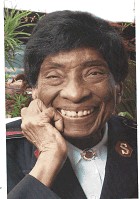Africa, the Blitz and Nixon: the life of Dorothy Purser
By: Lucy Page
Lieutenant Colonel Dorothy Purser was a Jamaican pharmacist and midwife who travelled to London during the Blitz to train as a Salvation Army officer. During her career she served in the UK, the West Indies and the United States. Dorothy had two assignments at Mother’s Hospital, Clapton, London, first as an officer in 1941, and later to assist in midwifery training from 1945 to 1947.
Born in 1913, she was the eldest child of Ezekiel and Ethel Purser, who were both Salvation Army officers. Her parents were sent to Nigeria by the Salvation Army, where they worked for seven years. During this time Dorothy learnt the Yoruba language in just six months to help them as an interpreter.
On returning to Jamaica, Dorothy’s parents worked as Salvation Army field officers. In order to fund Dorothy’s secondary school education, her father spent his spare time working as both a cobbler and a tailor. She subsequently passed the Overseas University of Cambridge exams, allowing her to study pharmacy.
Dorothy wanted to take full advantage of the opportunities available to her in England. So, despite hearing of two female students having lost their lives on a boat targeted by torpedoes only two weeks previously, in 1940 she travelled to London. There she spent a year in training as a cadet before being commissioned as an officer. During this time she was interviewed by the BBC about her studies. Dorothy began her career at Mother’s Hospital, focusing on developments in women’s health. In 1941 she returned to Jamaica to work at the Salvation Army’s training school and headquarters. However, a desire to resume her medical practice led her to leave Jamaica once more in 1945.
Over the next 34 years she worked both as a nurse and a nursing instructor, in the UK from 1945-53, and the US from 1953-1974. In 1961, she became the first Director of Parent and Nurses’ Aide Education and Assistant Director of Nursing at the Booth Hospital in Cleveland, Ohio. During her eleven years there, she founded and directed the Booth Talbert Clinic and Day Care Centre. Here she ran a groundbreaking programme for unmarried mothers, providing education, training, medical care, and a nursery. Her work here led to her receiving a citation for community service from Cleveland’s mayor. She also graduated with degrees in nursing from both the University of Cincinnati Nursing College, and the Western Reserve School of Social Administration in Cleveland.
As a senior Salvation Army officer, she also attended meetings of religious leaders at the White House, meeting the then president of the United States, Richard Nixon.
Her last position before retirement in 1979 was as chief secretary of the Caribbean and Central American Territory, becoming the first woman to hold the position. David Edwards, who served under Dorothy during these five years, described her as follows: ‘[Dorothy] may have known what it is to be afraid, but I cannot recall ever seeing her afraid. She was never happier than when [she was] in charge and solving other people’s problems.’
Dorothy Purser never married, choosing to dedicate her life to her work. She died in New York in 2018, at the age of 105.
![]()

Lt. Colonel Dorothy Purser
Image caption. Photo of Lt. Colonel Dorothy Purser.
Researching for the Mapping Black London project has not only allowed me to explore a compelling part of history, but has helped me to discover stories from my own family-Dorothy Purser was my great aunt. I never got to meet her, but getting to know her and her contribution to history through the project has been a fascinating experience.